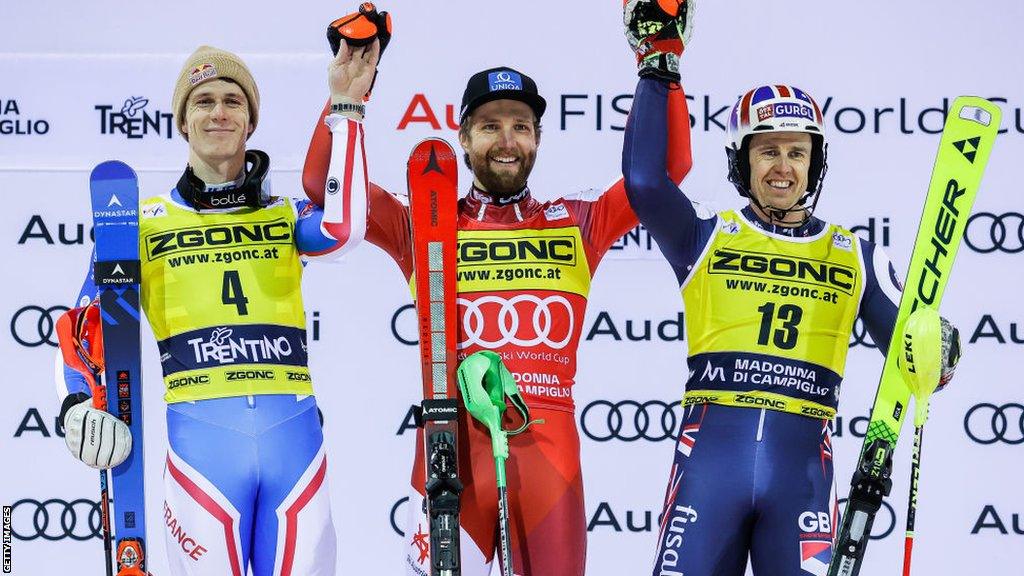Dave Ryding on climate change and alpine skiing, another Winter Olympics and best season
- Published

Dave Ryding (right) secured the seventh World Cup podium of his career last season
Britain's most successful alpine skier Dave Ryding says his sport needs to "move with the times" by shifting races to higher altitudes, and did not rule out the possibility of competing indoors.
Unseasonably warm temperatures hit the World Cup ski season this year, leading to race cancellations, including three out of 13 planned slaloms, which is his speciality.
Sorry scenes of a thin white strip of artificial piste snaking down an otherwise brown or green mountain have prompted questions over whether the days of alpine skiing as we know it might be numbered.
Ryding, on the back of his most successful season at the age of 37, said it was time for the sport's governing body, the International Ski Federation (FIS) to come up with a "Plan B" and that "this year was maybe a season too late" for change.
In an interview with BBC Sport, he said there were plenty of resorts at an altitude above 3,000m which could be used rather than scheduling races at only 800m in March.
Asked what his sport might look like for future generations, Ryding said: "I don't think they'll have to go indoors, but they could do. Saudi Arabia are building some almighty indoor ski slopes.
"I think it would go to higher altitudes first. I mean, we're still skiing on glaciers in the summer, and there's snow. So in the winter there's going to be snow."
Ryding, who started skiing on dry slopes, said he hoped they would not end up racing on those, though joked he would be "pretty good at it".
Heavy rain caused the cancellation of last month's slalom at Kranjska Gora, Slovenia (just above 800m), where temperatures were in the mid-teens, Celsius. That followed slaloms being scrapped in Val d'Isere, France in December because of rain and snow, and Bansko, Bulgaria after heavy rain in February.
Seven of the first nine alpine skiing World Cup men's races across all disciplines were cancelled in the 2023-24 season. In total 13 men's and eight women's races were cancelled, with five of those replaced.
After the men's slalom in Chamonix in February, where Swiss Daniel Yule staged an unprecedented comeback from 30th place after the first run to win the title, climatologist Mark Maslin said climate change had played a part.
The top 30 from the first run race in reverse order, meaning Yule started first on the second run before "snow started to melt quickly for the remaining racers in the sizzling 12 degrees Celsius", according to Maslin.
Ski Sunday: How climate change is affecting French glaciers
Ryding out to 'prove doubters wrong'
The questions about how the sport might look in future come at a time when Great Britain are enjoying success on the slopes, with Ryding saying the next 20 years "looks really good" for the team, particularly in slalom.
Ryding has finished on the podium in a World Cup race at least once in the past four seasons, securing his seventh this season with a third-place finish in Madonna di Campiglio, Italy in November.
He finished a career-best joint seventh in the overall slalom standings in his 15th World Cup season.
The success has come despite a cut in funding for the British alpine team by UK Sport following the 2022 Winter Olympics in Beijing for the next four-year Olympic cycle. Ryding and the others set up crowdfunding to continue their careers and are paying back their supporters with results.
Slalom team-mates Billy Major, 27, and Laurie Taylor, 28, have also enjoyed their best results this season - while behind them is Olympic Youth champion Zak Carrick-Smith - and Ryding thinks the team are proving they are "100% investible again".
"I never looked back with 'what ifs' but, certainly, I'm out there to prove myself and to prove those people wrong, whether they deemed me unfundable," he said.
"I really want to prove them wrong, to keep trying to show that I am worthy and I am still capable of doing these great results even though I am 37 now."
And how is even he managing that at 37?
"I don't really know, but I guess it's something in the Northern grit," said Ryding, who is from Chorley, Lancashire.
"And just staying motivated, keeping on top of my body health-wise and I've done that for 20 years now, so maybe that's paying off more so than, say, other athletes that haven't taken care of themselves over the years as well as I have."
Ryding aiming for another Olympics
Ryding, who has competed at four Winter Olympics, has previously said he wanted to "shrivel up and cry" if he thought about training for another Olympic cycle.
But with less than two years before the Milan-Cortina 2026 Games, he strikes a very different note.
"I've got over the hump now of the Olympic cycle," he said. "I've done two years, it's actually less than two years now to the Olympics. I'm still able to do seasons that are better than ever I've ever done before.
"If everything goes to plan, I'll be there."

Why did we lose the roadside restaurant chain Little Chef? The brand brought us Jubilee Pancakes, Olympic Breakfasts and free lollies
Family bonds, working class identity and growing up in Cardiff: An authentic and heart-warming series hosted by Welsh singing legend Charlotte Church
